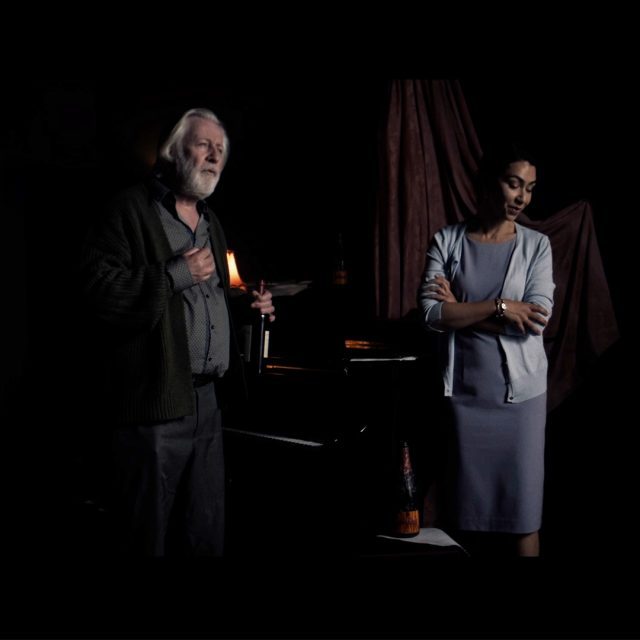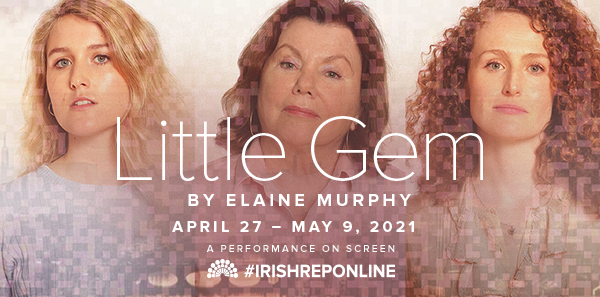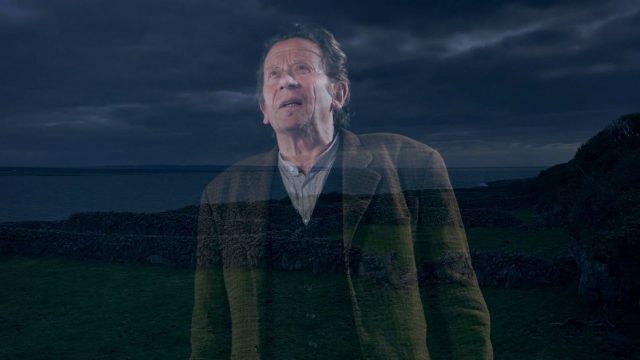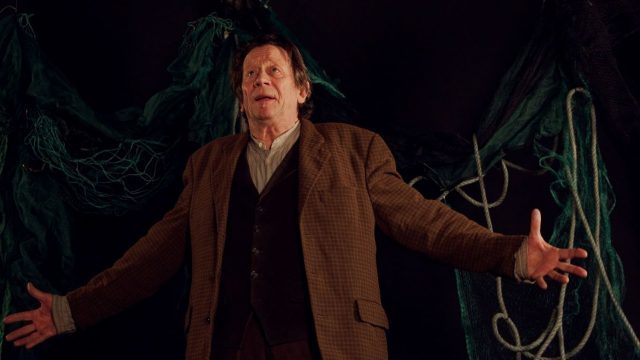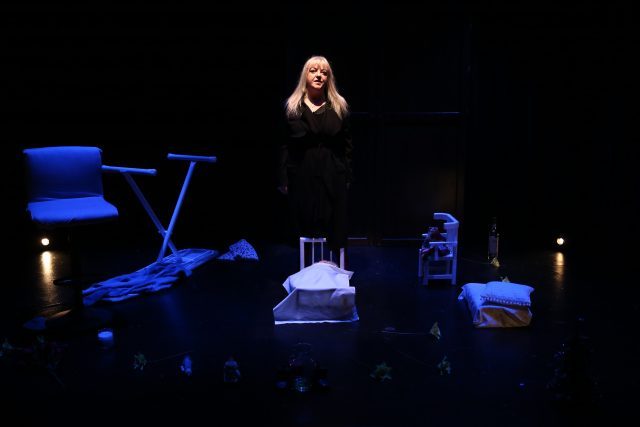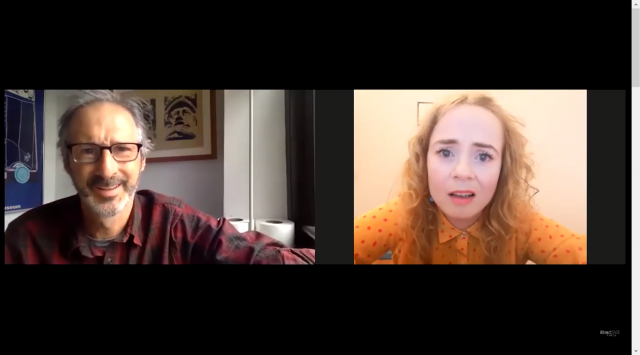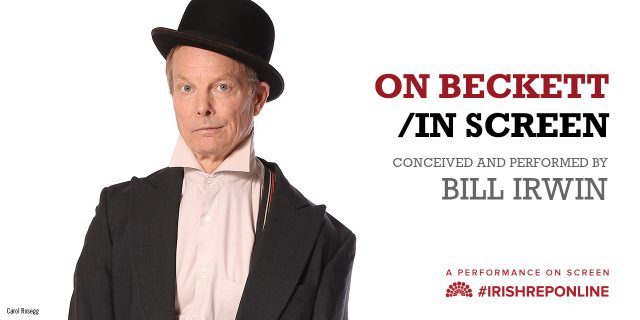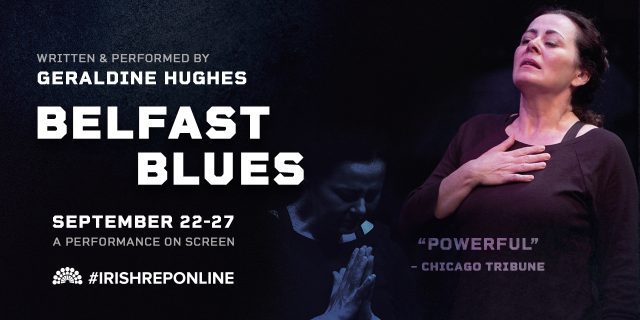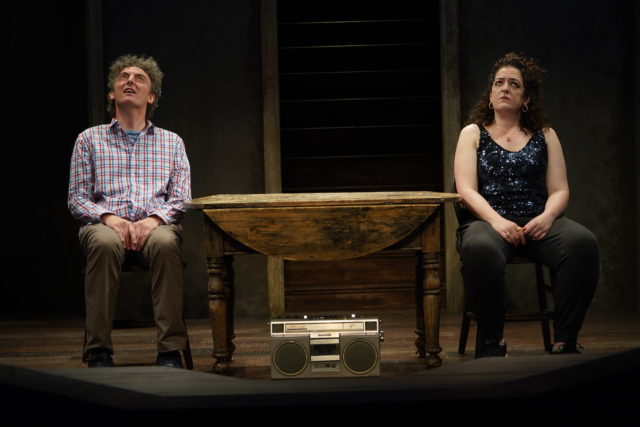
Life is not exactly looking up for Timmy (John Keating) and May (Maeve Higgins) in Autumn Royal (photo by Carol Rosegg)
AUTUMN ROYAL
Irish Repertory Theatre, Francis J. Greenburger Mainstage
132 West 22nd St. between Sixth & Seventh Aves.
Tuesday – Sunday through November 21, $50-$70
212-727-2737
irishrep.org
It was with a bittersweet wistfulness that I entered the Irish Rep for the first time in more than a year and a half. During the pandemic lockdown, the company was at the global forefront of digital theater, presenting more than a dozen outstanding livestreamed and recorded shows online, using cutting-edge technology that went far beyond Zoom boxes and clumsy green-screening. (Among the best were The Weir, Bill Irwin’s On Beckett / In Screen, and The Cordelia Dream; twelve of the shows are still available on demand.) Of course, I was excited to be back at the Francis J. Greenburger Mainstage on West Twenty-Second St. for a matinee, greeted by masked founding directors Charlotte Moore and Ciarán O’Reilly as I made my way in to sit with an audience of real people rather than virtual avatars Zooming in from home.
The Irish Rep has brilliantly reopened with the North American premiere of Kevin Barry’s Autumn Royal, a charming two-character, seventy-minute dark comedy that takes place on a claustrophobic set, an oddly appropriate reminder of the lockdown. The walls seem to be closing in on May (Maeve Higgins) and Timothy (John Keating), a pair of thirtysomething siblings who are caregivers for their ailing father, who lives upstairs in the attic. Charlie Corcoran’s set consists of a small table, two chairs, a doorway leading out of the house, and stairs to the attic, which appear ridiculously small and narrow, practically untenable. It’s as if May and Timmy are trapped, not only in their quaint Cork City home, but in the past, still reeling from their mother’s sudden departure when they were young. (“Went out for a packet o’ Birds custard and never came back,” Timmy recalls.)
Timmy dreams of moving to Australia to become a surfer, while May is much more realistic in their lack of options. She counters his talk of riding a wave with a detailed description of a local woman whose mother fell into a fireplace and “half the face melted off her.” It’s as if they’re fire and water, opposites who need each other.
Their father is never seen — it’s like he’s quarantining — but is occasionally heard, and every once in a while he bangs on the floor, sending dust and crumbling parts of the ceiling down on his grown children, who are not particularly fond of a poem he is writing about a duck walking across a puddle. However, the three of them bond over the 1982 song “Zoom” by Fat Larry’s Band, which Timmy blasts from an old boombox, on cassette. (Yes, even the name of the song evokes virtual theater, even though the play was first performed in Cork in 2017.)
May and Timmy share memories with little thought of their future. “I remember fucking everything,” May proclaims. A moment later, she adds, “We’re never going to get past ourselves here, Tim.” Timmy replies, “I’m definitely going to Australia, May. All I need is to have, like, two grand, I think is it?, in the, am . . .” She shoots back, “Timmy? You’re not going to make it as far as the Esso station.”
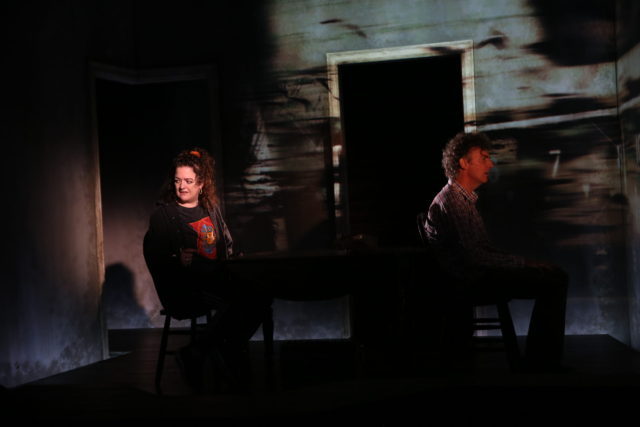
A haunting darkness hovers over a sister and brother in Irish drama (photo by Carol Rosegg)
They start to believe that their lives might be different if they put their father in a nursing home, but whenever they start thinking about how things can improve, their discussions turn sour. “All we’re doin’ now is talkin’ ourselves into a very dark read o’ things, yunno?” Timmy says. “Ah, the world sometimes is just complete . . . fucken . . . bollocks, like,” May opines. No matter which way they turn, regardless of their desires, they just seem to end up stuck back at home, their parents practically ghosts haunting their lives.
Directed by O’Reilly (The Weir, The Emperor Jones) with a deft touch, Autumn Royal features projections by Dan Scully, sometimes of blood covering a wall, while others evoke the siblings as kids in the back of a car on a Sunday drive to Tipperary, a beach scene, the silhouette of a mysterious woman, white picture frames, and, repeatedly, a loud washing machine, the spin cycle representing the inner chaos and repetition of their existence, just going around in circles. Keating (The O’Casey Cycle, Pericles) — a true New York theater treasure — and Higgins (Extra Ordinary, Naked Camera) deliver a terrific one-two punch as the arguing siblings, he tall, gangly, and comical, she short, tough, and harder-edged. They each get long monologues, but they really shine when they are both onstage, playing off each other like a classic comedy team, one goofy and wide-eyed, the other harshly direct and to the point. In his first stage work, novelist and short story writer Barry (Beatlebone, City of Bohane) adds a healthy dose of Irish doom and gloom to a common situation, one that hits a little closer to home in the time of Covid.
